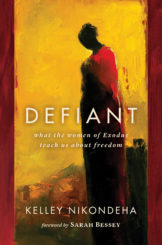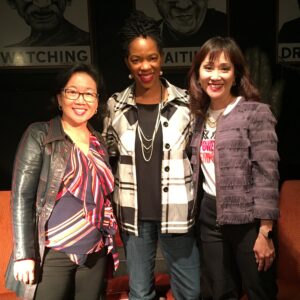
Pharaoh’s daughter was not the only one to see small bodies washed ashore. We have seen them too.
Born into privilege, Pharaoh’s daughter Bithiah* was nursed on narratives of Egyptian greatness. She grew up among the elite, watching them parade through the palace with curried favor and attendants. She never lifted a finger and never knew any different. Life was good alongside the Nile River, which seemed to wind and bend to her father’s command. She’d often visit the various balconies of his household and observe the slow rise of the mighty pyramids and storehouses. She marveled at his capacity to erect such feats of architecture. Everything around her father, from the palace pillars that seemed to hold up the sky to the mountain-shaped monuments emerging from the sands, communicated his massive strength and sweeping significance.
When the sun began to descend into the river and the world turned burnt orange with threads of pink, Bithiah sometimes walked the shoreline. She’d slip off her sandals to feel the warm sand and cool water in turn. While she was privileged, she wasn’t powerful, so she soaked in simple pleasures afforded her along the river.
One afternoon amid such a walk, a baby washed up, nearly touching her bare feet. A Hebrew boy, mere days old it appeared, drowned and now within arm’s reach. The servants ran to grab the child, as if to erase the incident altogether. Royal women weren’t supposed to witness the underside of life in the empire.
But they were too late. The waterlogged infant was the evidence she could not deny. As the serpentine river swallowed the sun whole, she came to know that all the rumors were true. Her father had turned the Nile into a watery grave.
In the following weeks, Bithiah kept to herself. She seldom took to the balcony, shunning Pharaoh’s demonstration of building prowess and the brutality she knew undergirded it. The monuments and brickyards made her feel small. Even a royal daughter could not stop the death dealing of a king. She spent a handful of sleepless nights staring out her window, keeping company with the moon. The only sounds that broke the midnight silence were the plaintive songs coming from across the river. Laments from bereft mothers carried dark truths from their camp. Bithiah felt complicit in the deathly way of things, and the sad songs gave an odd solace to her troubled spirit. Other than hum along, night after night, what could anyone expect her to do?
One day Pharaoh was marching out to the construction site with a regiment of armed guards to survey the progress firsthand. State counselors were convening in the grand hall to discuss matters of strategy to keep the Hebrews in their place. Servants scurried about, tending to the soldiers, the statesmen, and the royal women lounging in the gardens. No one took notice of the insignificant procession of the young woman and her maids down to the shore.
Bithiah, feeling the weight of her invisibility, disrobed and waded into the water. She engaged in a ritual bathing ceremony of her own design in an attempt to purge the filth of the empire. Something in her broke under the water’s surface. Maybe it was mingling in the currents rife with suffering, her pores absorbing the pain—maybe it was a rending that happens when chaos hammers your heart—but she emerged changed. Maybe she was just brokenhearted.
The sun shone like a spotlight on the tall reeds. Just then she noticed a basket bobbing in the waters, shaking the thicket just out of her reach. She waved to her handmaid, instructing her to retrieve the basket. She heard the cry—everything in her ached at the sound. This boy was alive.
◆ ◆ ◆
Bithiah is not the only one to see small bodies washed ashore. We have seen them too. Wearing a red T-shirt and blue shorts, lying facedown in the sand of a Turkish beach, Alan Kurdi was found dead. He drowned in the Mediterranean Sea as his family tried to escape the civil war in Syria on an overloaded boat captained by smugglers. When the morning sun crossed the coastline, a few locals saw the boy and attempted a rescue. But he was already gone. His lifeless body became a testament to the perils facing refugee families, an image we could not deny.
What could we do? Give to organizations that advocate for refugees? Write our leaders and implore them to support refugee resettlement in the United States? Pray harder in our church services or light candles of remembrance? I did all these things and still felt helpless. Regimes of death dwarf us all, despite our living in enclaves of relative privilege. However, this does not mean we are easily exempt from confronting the injustices that threaten our neighbors, global and otherwise.
We are all called to rescue the vulnerable ones regardless of which side of injustice we live on.
We are like Bithiah—privileged yet seemingly powerless, paralyzed. From the outside it appears as if there is only privilege, only complicity. But walking through the palace compound, we find that ease can be punctuated with growing dis-ease. One can be trapped with little or no way to influence the pharaoh. We benefit—and we are bothered.
Initially Bithiah found herself in a closed system of complicity, a pharaonic beneficiary who imagined herself unable to effect any real change. She was one of many royal daughters—and she was not even her father’s favorite. But once she began to see the truth, there were decisions to be made.
◆ ◆ ◆
In the Exodus narrative, the Nile River cuts between the Hebrew and Egyptian communities, snaking through the land like a predator. Deep with meaning, the river is a character to be reckoned with. Ancients understood bodies of water to hold the power of life and death, and rumors abounded that monsters like Leviathan roamed the depths. A later Hebrew prophet named Pharaoh himself a monster who lurks about the Nile, assuming it belongs to him. We do see those monstrous tendencies on display in the story at hand as he turns a life-giving river into a flow of tiny graves. Whatever the monster the Egyptians or Hebrews thought inhabited the Nile far beneath the crocodiles and hippos, the narrator wants us to see the waters as a metaphor of injustice.
What separates these two communities is a dangerous and deadly injustice. As we watch the women crisscross the currents, we ought not to mistake their movements for a simple swim; rather, they are confronting treacherous forces that seek to undo them and those they love. Jochebed, Moses’s mother, braves the waters so that her son might survive. Jochebed’s daughter, despite her young age, dives into the waters after her mother so that she can keep watch over her brother. And when Bithiah accepts the boy in her arms, the water of ritual cleansing is revealed to be the risk-laden river of rescue she must learn to navigate with the other women.
Watching these women enter into the waters of injustice to thwart pharaonic foes lights my imagination. What can I do to defy the pharaohs of my day and rescue those threatened by the destructive undercurrent of the rivers cutting through our communities? What are the leviathans of our own making—economic inequality, mass incarceration, inaccessible health care for the poor, gun violence—that beset us? What injustice plagues my zip code—and am I willing to follow the women into the rivers of risk and rescue? Will I hike up my skirt and wade in like Bithiah, joining the other women already buffeting the tide?
◆ ◆ ◆
These daughters demonstrate the power to defy death from any side of the river. They show that the resistance is not limited to one tribe or one segment of the wider sisterhood but is open to any woman willing to enter the fray and work for freedom. Pharaoh’s own daughter might be seen as the height of privilege and incapable of feeling any urge for resistance. But Bithiah surprises us. The Spirit is at work in her, and Jochebed creates an opportunity for her to shake off her paralysis and to act on behalf of life. It is what happens when we allow ourselves to be surprised by one another and accept the invitation, even the necessity, of relationship to navigate the waters of injustice. We are all daughters, all called to rescue the vulnerable ones regardless of which side of injustice we live on.
…resistance is not limited to one tribe or one segment of the wider sisterhood but is open to any woman willing to enter the fray and work for freedom.
Rescue work is a series of small moves in quick succession, each person doing what she can to move vulnerable ones toward safety. The plan might not be clear at the onset, but every move matters. So we watch and respond. We are poised at the starting line, listening for the starter gun. This is how we wait for the Lord—or the next woman.
*The name of Pharoah’s daughter is not mentioned in the Hebrew Bible. However, Jewish tradition offers different names for her. I follow Vayikra (Leviticus) Rabbah 1:3 when I call her Bithiah, Hebrew for “daughter of YHWH.”
Kelley Nikondeha is the co-director and chief storyteller for Communities of Hope, a community development enterprise in Burundi. She is the co-founder of Amahoro Africa, a conversation between theologians and practitioners within the African context. She is also the author of Adopted: The Sacrament of Belonging in a Fractured World. Learn more about her on her website.
This excerpt is adapted from Defiant: What the Women of Exodus Teach Us about Freedom, by Kelley Nikondeha. Reprinted by permission of Eerdmans Publishing.


